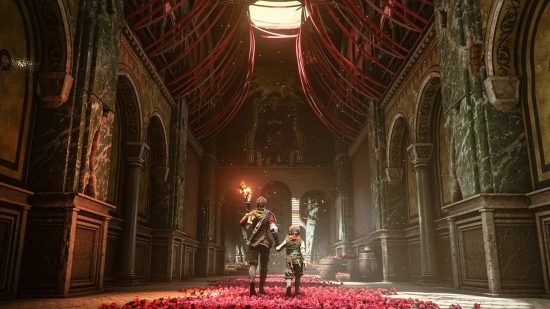Amicia and Hugo’s journey in A Plague Tale: Requiem is fraught with strife and defined by anguish. As the rat game‘s protagonist starts to crumble under the weight of a hostile world, her mental state unravels, twisting into a PTSD-driven spiral. PCGamesN caught up with Charlotte McBurney, the BAFTA-nominated voice actor for Amicia, on the ground at WASD to discuss how both she and her character evolved during Requiem.
McBurney is a soft-spoken, polite Englishwoman, whose nervous excitement matches the buzz of WASD itself. It’s a hectic time for Plague Tale: Requiem, which has been nominated for several BAFTA Games awards in the wake of last year’s somewhat disappointing Game of the Year Awards. McBurney is up for best performer in a leading role; something she has more than earnt.
As discussed in our Plague Tale: Requiem review, McBurney’s Amicia is no longer the innocent young girl of Asobo’s first game. Instead, she’s hardened, battle-ready, and ruthless in her pursuit of a cure for Hugo. She kills without fear and punishes without regret, yet the violence has taken its toll on her mental state. Stricken by PTSD, the story game‘s focus is as much on mental health as it is the rats, and McBurney admits that playing the part of a shattered teen was no walk in the park.

“When I read the script at home, I would cry,” she tells PCGamesN. “I was definitely drawing on things that I’ve been through, things people I know have been through – real [things]. I was definitely channelling a lot from my own experiences.
“It was very fun to explore in a very weird, macabre way, because it’s not often that someone says ‘here, let loose.’ We did one section where they said ‘can we just stand you in front of the mic, and can you just cry?’ So I just stood and wept for like, five minutes. That’s probably the most cathartic thing that I’ve ever done – not that I’m hurting, but it’s a good thing. We should all try it!”
Amicia’s emotions are what make her so relatable – it’s one of the reasons I fell so in love with her as a character. With a smile she says “I sort of thought of [the recording booth] like a wreck room – you know those places where you go in and wreck plates and things – that’s what working on Requiem was like; it’s like going in there but with my emotions and just letting loose.”
“When I read the script for the first time I was like ‘oh my god [the writer] has seen right through me, it’s terrifying! Why has he written me as a character?’ and then when I spoke to [him] about it [he] was like ‘oh, I’ve written myself.’”
Trauma, anxiety, and mental health transcend temporal boundaries, and that’s one of the things that makes Requiem – and the Plague Tale series as a whole – so powerful. If you haven’t played yet, I really suggest you take the game out for a whirl; just ensure you have some tissues nearby and potentially a tub of ice cream.
If you do, we have a rundown of the Plague Tale: Requiem system requirements to make sure your rig can withstand the might of the Macula, or if you’ve already played and had your heart broken, we have a list of the best stealth games to keep you entertained.
Interview conducted by Nat Smith at WASD 2023.


